Today marks International Youth Day. To celebrate, we are profiling some of the many youths who are working tirelessly to improve education in their communities and around the world.
1. Malala Yousafzai won the Nobel Peace Prize for her advocacy for education
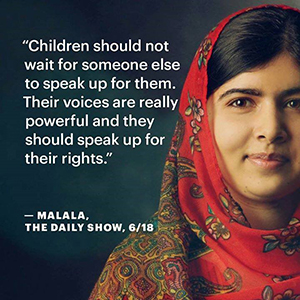
In December 2014, Malala Yousafzai won the Nobel Peace Prize for her advocacy for education around the world. Since surviving an attack on her life by the Taliban in October 2012, she has dedicated herself to ensuring that the 124 million children and youth who are not in school have the opportunity to go to school and learn. Malala is now calling on donor governments to fill the $39 billion per year financing gap to achieve the education Sustainable Development Goal to be launched at the UN General Assembly in September this year.
2. Young people made their voices heard in the development of the Global Goals to be adopted next month
Youth have made their voices and opinions heard over the last two years as consultations were held around the world and within the United Nations to develop the next set of Global Goals that will follow the Millennium Development Goals. Through the Major Group on Children and Youth, young people have taken a seat alongside world leaders at the decision table to give their feedback on the 17 goals and 169 targets that will affect their generation over the next 15 years.
Youth also participated in consultations such as My World survey: 78% of respondents were under the age of 30 and 44% of respondents ranked "a good education" as their top priority.
3. Leroy Philips advocates for youth with disabilities
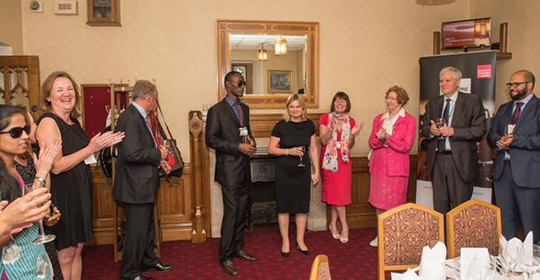
Leroy Philips (center) with Justine Greening, UK Secretary of State for International Development
Leroy Philips, a young man from Guyana, has had his own struggle to pursue an education after an accident left him blind at the age of six. However, he did not let barriers deter him. Leroy went on to finish high school and now works to empower other young people to pursue their education through his radio program and role as the President of Leonard Cheshire Disability's Young Voices chapter in Guyana.
In June 2015 Leroy was honored as one of the Queen's Young Leaders Award recipients. After receiving the award in London, Leroy met with heads of state and education champions such as UK Secretary of State for International Development Justine Greening and discussed the importance of financing education for the most marginalized children, including those with disabilities.
4. Nigerian youth advocate for children in Northern Nigeria

The abduction of over 200 schoolgirls by the terrorist group Boko Haram in northern Nigeria took the world’s attention by storm in April 2014. Young people in Nigeria had already been advocating fiercely – and continue to do so – for safe, quality education for their peers. Abdul Tashiu is one of those youth leaders. Abdul is from Kaduna State in Northern Nigeria and fled with his family in 2011 following post-election violence. Abdul now volunteers in a camp for the internally displaced in Abuja. He ensures the school runs smoothly and has been instrumental in connecting national education organizations with the displaced community to make sure their children continue to get an education.
5. In Uganda young women are inspiriting teen mothers to continue their education
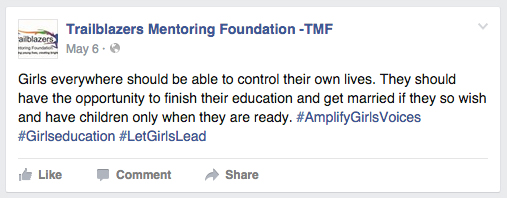
In Uganda, 1 in 4 girls between the ages of 15 and 19 is pregnant or already a mother. Teen mothers face a high likelihood of dropping out of school and not finishing their education. Thankfully, young women are taking charge to ensure their peers stay in school by removing barriers to education for teen mothers. In 2013, two former teen parents founded Trailblazers Mentoring Foundation to empower out-of-school youth, particularly young mothers, to continue their education. Young women mentor other youth on education and also livelihoods and sexual and reproductive health.
6. United Nations Youth Envoy makes quality education a priority
In February 2013, the Secretary General of the United Nations appointed the first-ever Youth Envoy, Ahmad Alhendawi. Ahmad, a native of Jordan, has made youth employability one of his priorities. Ahmad knows that without a quality and relevant education, children and youth will not have the skills they need to find meaningful work. In addition to advocating for better policies on youth training, employability and education, Ahmad has called on world leaders to include youth in the policy-making process from the beginning to ensure policies are relevant and meet the needs of those they are meant to serve.
7. Youth in Nepal help their country rebuild after the earthquake
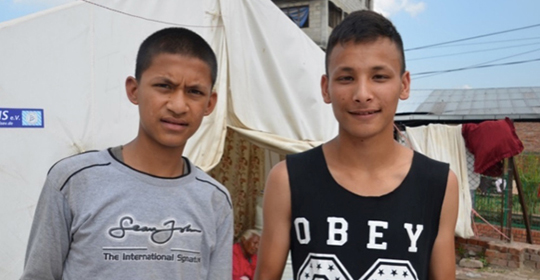
Every morning before going to school, Purushottam (left), 13, and Tejan (right),16, do a round of tents in their temporary camp and take the names of occupants so that food can be distributed fairly in the evening by a charity organization. They have been living in tents like these since the earthquakes of April and May 2015 destroyed their homes. Nepal’s future is in good hands thanks to an amazing number of youth like them who stood up in the midst of their national hardship.
8. Youth are teaching other young people how to be advocates for education in their country
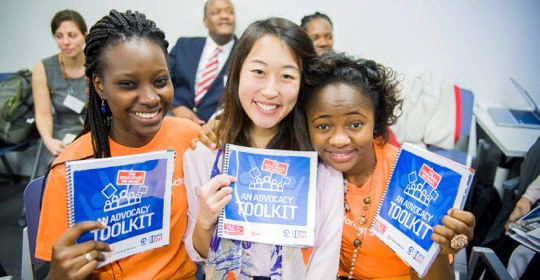
The Youth Advocacy Group (YAG) to the Secretary General's Global Education First Initiative have been advocates for education in the halls of the United Nations, alongside Malala Yousafzai and in their own countries. As part of their mission to engage other youth in improving education, the YAG designed a Youth Advocacy Toolkit to teach other young people how to be advocates for education in their communities and countries. Youth organize advocacy trainings around the world to work with young people and adapt the toolkit to their local priorities.
9. Young filmmakers are showing the world how young women are empowered through education
Plan International has worked with women and young filmmakers to highlight the challenges that girls face in going to school and completing their education. As a form of peer mentorship, Plan International worked with female filmmakers to document these challenges, including poverty, discrimination, violence and early marriage. Their message to young women is to be empowered through education.
10. Youth are shaping the agenda on education in humanitarian emergencies
In advance of the first-ever World Humanitarian Summit in May 2016, youth around the world are shaping the agenda and priorities through global consultations. Youth in South East Asia and the South Pacific regions that have suffered national disasters over the last few years, have raised the importance of sustainability and education in the consultations.
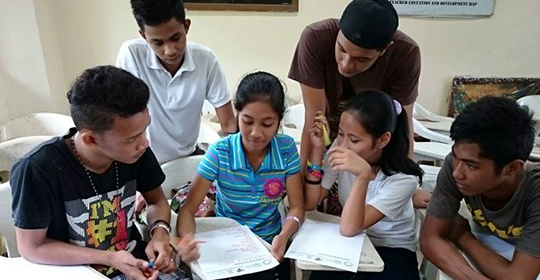
Consultation of July 31 at Tacloban City, Leyte, Philippines, organized by the Asean Youth Leaders Association and the International Youth Council – Pilipinas.
Credit: World Humanitarian Summit Youth Involvement
What about you? Do you know amazing young people like the ones described here? Please share their stories on how their efforts help education around the world.
